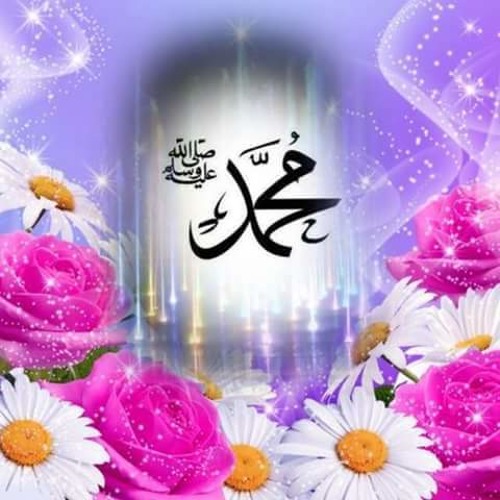
Nutze die Energien deiner Seele
Aus den Realitäten von Mawlana (Q), wie von Shaykh Nurjan Mirahmadi
From the Realities of Mawlana (Q) as taught by Shaykh Nurjan Mirahmadi
A’udhu Billahi Minash Shaitanir Rajeem
Bismillahir Rahmanir Raheem
Ich suche Zuflucht bei Allah vor Satan, dem Zurückgewiesenen
Im Namen Allahs, des Wohltätigsten, des Barmherzigen
I seek refuge in Allah from Satan, the rejected one
In the Name of Allah, the Most Beneficent, the Most Merciful
Dieser spirituelle Wege basiert auf dem Atem
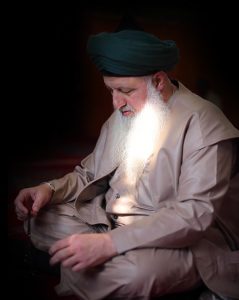 Im Sufismus geht es darum, uns selbst in einem Ozean des Lichts vorzustellen. Aus sechs Richtungen kommt Licht: vor Dir, rechts von Dir, links von Dir, hinter Dir, über Dir und unter Dir. Und in der Meditation meditierst Du aus der Realität des Lichts. Bitte also darum, in den Ozean des Lichts eintreten zu dürfen. Bitte darum: „Oh, mein Herr, lass mich in aus diesen sechs Richtungen in den Ozean des Lichts eintreten zu dürfen und bitte erlöse mich von jedweder Dunkelheit und Schwierigkeit.“
Im Sufismus geht es darum, uns selbst in einem Ozean des Lichts vorzustellen. Aus sechs Richtungen kommt Licht: vor Dir, rechts von Dir, links von Dir, hinter Dir, über Dir und unter Dir. Und in der Meditation meditierst Du aus der Realität des Lichts. Bitte also darum, in den Ozean des Lichts eintreten zu dürfen. Bitte darum: „Oh, mein Herr, lass mich in aus diesen sechs Richtungen in den Ozean des Lichts eintreten zu dürfen und bitte erlöse mich von jedweder Dunkelheit und Schwierigkeit.“
Bitte darum, Dich in diesem Licht zu sehen und in diesem Licht zu atmen, so dass wir unsere Schwierigkeiten und Dunkelheit ausatmen und von der göttlichen Anmut und dem göttlichen Licht einatmen. Der Atem im tafakkur und der Meditation ist rahmah und Barmherzigkeit von Allahs (AJ) immenser Barmherzigkeit und seiner Anmut. So ist es, dass wenn Du es in diesem Bewusstsein einatmest, jeder spirituelle Weg und jeder spirituelle Meister der Naqshibandia sagt: „Unser Weg ist ein Weg des Atems.“
This Way is Based on the Breath, Hosh Dar Dam
The way of Sufism is to see our ourself in an ocean of light. In six directions there is light; in front of you and to the right of you, to the left of you, behind you, above you, and below you. And that the way of meditation through their [awliya (saints)] training is that you’re going to be meditating from the reality of your light. So, ask to be in that ocean of light and that, ‘My lord, let me enter into that ocean of light from all these six directions and take away every darkness and every difficulty.’ And asking to see ourselves in that light and breathe within that light, and that everything we exhale of difficulties and darkness, and everything that we inhale of His Divinely Grace and Divinely Lights. That that breath in tafakkur and in mediation is a rahmah and a mercy of Allah’s (AJ) immense Rahmah and Grace. That as soon as you breathe it in with that consciousness, and every spiritual path and every spiritual master of the Naqshbandi order says, ‘Our way is based on the breath, Hosh dar dam (conscious breathing).‘
Unser Atem der Barmherzigkeit ist unser Geschenk des Lebens
 Wenn du also nicht verstehst, was es mit dem Atem auf sich hat oder du die Prinzipien der Tariqah nicht verstehst, wirst du auch nicht deren Kraft oder Realität erlangen.
Wenn du also nicht verstehst, was es mit dem Atem auf sich hat oder du die Prinzipien der Tariqah nicht verstehst, wirst du auch nicht deren Kraft oder Realität erlangen.
Daher ist es essentiell, nichts zu tun, was den Atem verschmutzen und belasten könnte. Halte Dich fern von Dingen, die Deinem Atem schaden, denn der Atem stammt von Allahs (AJ) Anmut und Seiner immensen rahmah und Barmherzigkeit. So spricht der Herr: „Ich habe von meinem Geist in Dich hinein geblasen.“
﴾فَإِذَا سَوَّيْتُهُ وَنَفَخْتُ فِيهِ مِن رُّوحِى فَقَعُواْ لَهُ سَـجِدِينَ ﴿٢٩
15:29 – “Fa idha sawwaytuhu wa nafakhtu feehi min Rohee faqa’o lahu sajideen.” (Surat Al-Hijr)
“Wenn ich es zurechtgeformt und von meinem Geist, dann fallt und werft euch vor ihm nieder.” (Qur- an, Al- Hijr, Sure 15, Vers 29)
Das bedeutet also, dass im nafas ur-rahmah (der Atem der Barmherzigkeit) ein Geheimnis innewohnt, das uns Allah (AJ) geschenkt hat und dass unser Mittel ist, um uns im Leben zu versorgen.
Und wenn wir atmen, ist es ein Geschenk des Lebens. Jeder Atem ist ein Geschenk des Lebens. 24.000 atmen wir täglich ein und aus, sagen einige awliya (Heilige).
Our Breath of Mercy is Our Gift of Life
That if you don’t understand the breath and you don’t understand the principles of tariqah (spiritual path), it’s a great loss of that power and that reality. So, then you don’t do things to contaminate the breath. Stay away from things that would damage the breath because the breath is God’s grace, Allah’s (AJ) immense Rahmah and Mercy that, ‘I blew into you of My Spirit.’
﴾فَإِذَا سَوَّيْتُهُ وَنَفَخْتُ فِيهِ مِن رُّوحِى فَقَعُواْ لَهُ سَـجِدِينَ ﴿٢٩
15:29 – “Fa idha sawwaytuhu wa nafakhtu feehi min Rohee faqa’o lahu sajideen.” (Surat Al-Hijr)
“So when I have proportioned him and breathed into him of My [created] soul/spirit, then fall down to him in prostration.” (The Rocky Tract, 15:29)
So, it means nafas ur-rahmah (breath of mercy) is a secret that Allah (AJ) gave to us that is our means of sustaining ourself in this life. As we breathe, that is a gift of life. Every breath is a gift of life. Twenty-four thousand, some awliya (saints) say, in every day.
Bitte darum, in der Anwesenheit des Propheten ﷺ atmen zu dürfen
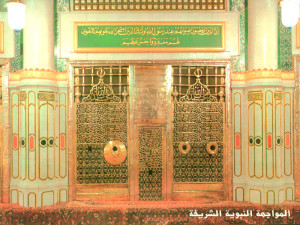 Daher sollten wir immer bewusst atmen. Es gilt diesen Atem zu erwachen und zu verstehen und Allah (AJ) zu danken, dass ich aus deiner göttlichen Barmherzigkeit atme, ya Rabbi, ich atme aus deiner immensen rahma und dass wir dann den immensen Segen unseres Atems sehen. Wir sehen uns dann in einem Ozean des Lichts, in dem wir gewaschen und gereinigt werden. Diejenigen, die ein noch höheres Verständnis der Kontemplation erlangt haben, bitten darum, diesen gleichen Atem in der Anwesenheit von Sayyidina Muhammad ﷺ zu atmen. Dann stellen wir uns vor, an der Rauza Sharif zu sein, dass wir Masjid an-Nabawi, die Heilige Moschee unseres Propheten ﷺ und das Grab von Sayyidina Muhammad ﷺ sehen können.
Daher sollten wir immer bewusst atmen. Es gilt diesen Atem zu erwachen und zu verstehen und Allah (AJ) zu danken, dass ich aus deiner göttlichen Barmherzigkeit atme, ya Rabbi, ich atme aus deiner immensen rahma und dass wir dann den immensen Segen unseres Atems sehen. Wir sehen uns dann in einem Ozean des Lichts, in dem wir gewaschen und gereinigt werden. Diejenigen, die ein noch höheres Verständnis der Kontemplation erlangt haben, bitten darum, diesen gleichen Atem in der Anwesenheit von Sayyidina Muhammad ﷺ zu atmen. Dann stellen wir uns vor, an der Rauza Sharif zu sein, dass wir Masjid an-Nabawi, die Heilige Moschee unseres Propheten ﷺ und das Grab von Sayyidina Muhammad ﷺ sehen können.
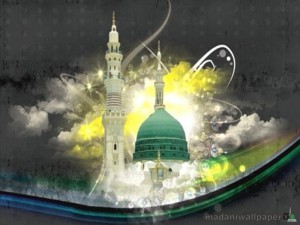 Wir bitten also darum, uns in der Rauza Sharif zu sehen und ‘Ya Rabbi, ich bitte Dich, mein Herz mit Sayyidina Muhammad ﷺ zu verbinden und in seiner Anwesenheit sein zu dürfen.’ Syeddi Ya Rasul-e-Kareem Ya Habeeb ul Azeem unzur halana wa ishfalana bi Madadakum an Nazarakum, und ich bezeuge, dass ich nichts bin absolut nichts- ich bitte um nichts für mich und denke nicht von mir etwas zu sein. Ich komme gewiss nicht mit meinem amal (Taten), meinem salah (Gebet) oder gar meiner zakat (Almosen/ Mildengabe), meinem sawm (Fasten), nein: ich bin nichts.
Wir bitten also darum, uns in der Rauza Sharif zu sehen und ‘Ya Rabbi, ich bitte Dich, mein Herz mit Sayyidina Muhammad ﷺ zu verbinden und in seiner Anwesenheit sein zu dürfen.’ Syeddi Ya Rasul-e-Kareem Ya Habeeb ul Azeem unzur halana wa ishfalana bi Madadakum an Nazarakum, und ich bezeuge, dass ich nichts bin absolut nichts- ich bitte um nichts für mich und denke nicht von mir etwas zu sein. Ich komme gewiss nicht mit meinem amal (Taten), meinem salah (Gebet) oder gar meiner zakat (Almosen/ Mildengabe), meinem sawm (Fasten), nein: ich bin nichts.
Ich komme als Armer, als Bettler. Ich bin absolut ausgelöscht in meinem Nichts- Sein. Ich komme lediglich zu Deiner Rauza Mubarak (heilige Kammer unseres Propheten Muhammad ﷺ). In dem Segen, den Dir Allah (AJ) hat zuteil werden lassen, ich bitte Dich hier zu sein in Deinem Nazar (Blick). Mögest Du mit Deiner Rahmah (Barmherzigkeit), deinen Gebeten für mich, Schwierigkeiten und Probleme aus meinem Leben nehmen.
Ask to Breathe in the Presence of Sayyidina Muhammad ﷺ
So, that breath should be in a consciousness. That breath should be awakened and understood that I’m breathing from Your Divine Mercy, Ya Rabbi, I’m breathing from Your immense Rahmah and that to see the immense blessings of that breath. If we see ourself in that ocean of light in front of us, then to be washed and cleansed. Those that have a higher understanding of the tafakkur (contemplation), they are asking to breathe that same breath but in the presence of Sayyidina Muhammad ﷺ. That see ourselves at Rauza Sharif and online you can see Masjid an-Nabawi, the holy gate and which is blocking from the presence and the grave of Sayyidina Muhammad ﷺ.
The Rauza Sharif, that asking to see ourselves there and that, ‘Ya Rabbi, I’m asking to breathe in this presence and to connect my heart with Sayyidina Muhammad ﷺ’. Syeddi Ya Rasul-e-Kareeem Ya Habeeb ul Azeem unzur halana wa ishfalana bi Madadakum an Nazarakum, that I am completely nothing, I’m nothing; I’m not asking and thinking that I’m anything. I’m not coming with my amal (actions), my salah (prayer) or my zakat (charity), my sawm (fast), I’m nothing. I’m coming as if just a faqir. I’m absolutely effaced in my nothingness; I’m coming just to your Rauza Mubarak (Sacred Chamber/burial site of Prophet Muhammad ﷺ). Your immense blessings that Allah (AJ) has dressed upon you and I’m asking just to be here under Your Nazar (gaze). That by Your Rahmah (mercy), your prayers upon me to take away difficulties, take away obstacles in my life.
Bitte darum, am Fuße von Sayyidina Muhammad ﷺ sein zu dürfen
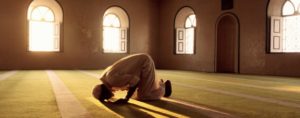 Diejenigen, die in ihrem Verständnis nicht höher gelangen können, bitten darum am Fuße am qadam, dem heiligen Fuße von Sayyidina Muhammad ﷺ sein zu dürfen. Unser Weg basiert nicht auf dem Ego in der Annahme, dass es sich um etwas Großartiges handeln würde, sondern wir bitten unseren Herrn darum durch eine Tür zu kommen im Bewusstsein, dein niedrigster Diener zu sein. Ich bitte sogar darum durch die Tür des Unglaubens treten zu dürfen, weil ich all mein amal (meine Taten) negiert habe. Wenn Du, mein Herr, wenn Du etwas Gutes darin finden solltest, dann nur wegen Deiner immensen Rahmah (Barmherzigkeit). Ich finde nichts Gutes darin und so komme ich mit nichts, Ya Rabbi, lass mich nur mein Gesicht und meine Stirn auf die heiligen Füße von Sayyidina Muhammad ﷺ legen. Dies ist ein sujood al-ihtiram (Verbeugung/ Niederwerfung des Respekts), es ist die Art Respekt, die die Engel Sayyidina Adam (as) zollten, als sie sich vor ihm niederwarfen, weil sie sich in Wahrheit dem Nurul Muhammadi ﷺ within Sayyidina Adam (as) (dem Lichte Muhammads in Sayyidina Adam) niederwarfen.
Diejenigen, die in ihrem Verständnis nicht höher gelangen können, bitten darum am Fuße am qadam, dem heiligen Fuße von Sayyidina Muhammad ﷺ sein zu dürfen. Unser Weg basiert nicht auf dem Ego in der Annahme, dass es sich um etwas Großartiges handeln würde, sondern wir bitten unseren Herrn darum durch eine Tür zu kommen im Bewusstsein, dein niedrigster Diener zu sein. Ich bitte sogar darum durch die Tür des Unglaubens treten zu dürfen, weil ich all mein amal (meine Taten) negiert habe. Wenn Du, mein Herr, wenn Du etwas Gutes darin finden solltest, dann nur wegen Deiner immensen Rahmah (Barmherzigkeit). Ich finde nichts Gutes darin und so komme ich mit nichts, Ya Rabbi, lass mich nur mein Gesicht und meine Stirn auf die heiligen Füße von Sayyidina Muhammad ﷺ legen. Dies ist ein sujood al-ihtiram (Verbeugung/ Niederwerfung des Respekts), es ist die Art Respekt, die die Engel Sayyidina Adam (as) zollten, als sie sich vor ihm niederwarfen, weil sie sich in Wahrheit dem Nurul Muhammadi ﷺ within Sayyidina Adam (as) (dem Lichte Muhammads in Sayyidina Adam) niederwarfen.
﴾فَإِذَا سَوَّيْتُهُ وَنَفَخْتُ فِيهِ مِن رُّوحِي فَقَعُوا لَهُ سَاجِدِينَ ﴿٧٢
38:72 – “Fa idha sawwaytuhu wa nafakhtu feehi min Rohee faqa’o lahu sajideen.” (Surat Sad)
“Wenn Ich es zurechtgeformt und ihm von Meinem Geist eingehaucht habe, dann fallt und werft euch vor ihm nieder.” (Qur-an, Saad, Sure 38, Vers 72)
Ask to Be At the Foot of Sayyidina Muhammad ﷺ
Those that can go higher in their understanding they ask to be at the qadam and the foot, the holy foot of Sayyidina Muhammad ﷺ. Our way is not based on the ego and thinking that it’s something great but asking that I’m coming through the door, my lord, of your lowest servant. I’m asking to come through the door of disbelief and I have negated all my amal (actions). If You find anything good in it, that’s by Your immense Rahmah (mercy). Me, I found nothing good in it and I’m coming with absolutely nothing, Ya Rabbi, let me just to keep my face and my forehead on the holy feet of Sayyidina Muhammad ﷺ. This is a sujood al-ihtiram (prostration of respect), this is a respect that the angels were told to bow down to Sayyidina Adam (as) and they bowed down to the Nurul Muhammadi ﷺ within Sayyidina Adam (as).
﴾فَإِذَا سَوَّيْتُهُ وَنَفَخْتُ فِيهِ مِن رُّوحِي فَقَعُوا لَهُ سَاجِدِينَ ﴿٧٢
38:72 – “Fa idha sawwaytuhu wa nafakhtu feehi min Rohee faqa’o lahu sajideen.” (Surat Sad)
“So when I have proportioned him and breathed into him of My [created] soul/spirit, then fall down to him in prostration.” (Saad, 38:72)
Sayyidina Adam (as) wurde mit dem Nurul Muhammadi ﷺ gesandt
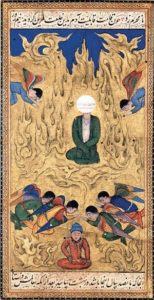 Das Licht, das sie bereits aus der göttlichen Präsenz kannten, drang in das Geschöpf Adams (as) ein. Sie waren erstaunt darüber, dass das Licht nun in diese menschliche Schöpfung drang, den dieses Lciht hatten sie noch nicht in ihrem Bereich gesehen. Und das ist Allah’s (AJ) Rahmah, (Barmherzigkeit) dass Ich Meinen khalifa (Statthalter) erschaffe und ihm dieses besondere Licht schenke, so dass den Engeln gesagt wurde, sich ´niederzuwerfen´.
Das Licht, das sie bereits aus der göttlichen Präsenz kannten, drang in das Geschöpf Adams (as) ein. Sie waren erstaunt darüber, dass das Licht nun in diese menschliche Schöpfung drang, den dieses Lciht hatten sie noch nicht in ihrem Bereich gesehen. Und das ist Allah’s (AJ) Rahmah, (Barmherzigkeit) dass Ich Meinen khalifa (Statthalter) erschaffe und ihm dieses besondere Licht schenke, so dass den Engeln gesagt wurde, sich ´niederzuwerfen´.
﴾وَإِذْ قَالَ رَبُّكَ لِلْمَلاَئِكَةِ إِنِّي جَاعِلٌ فِي الأَرْضِ خَلِيفَةً… ﴿٣٠
2:30 – “Wa idh qala rabbuka lil Malayikati innee ja’ilun fil ardi khaleefatan,…” (Surat Al-Baqarah)
“Und als dein Herr zu den Engeln sagte:” Ich bin dabei, auf der Erde einen Statthalter einzusetzen“ (Qur-an, Die Kuh, Sure 2, Vers 30)
Sayyidina Adam (as) Was Sent With Nurul Muhammadi ﷺ
That nur (light) that they knew from Divinely Presence, it entered into this creature known as Adam (as). As a result of that light entering into that creation, their astonishment that that light is not a light that they saw in their realm. And that was Allah’s (AJ) Rahmah (mercy) that I am creating my khalifa (deputy) and I am sending this special light within it and the angels were told to ‘bow down’.
﴾وَإِذْ قَالَ رَبُّكَ لِلْمَلاَئِكَةِ إِنِّي جَاعِلٌ فِي الأَرْضِ خَلِيفَةً… ﴿٣٠
2:30 – “Wa idh qala rabbuka lil Malayikati innee ja’ilun fil ardi khaleefatan,…” (Surat Al-Baqarah)
“And [mention, O Muhammad], when your Lord said to the angels, “Indeed, I will make upon the earth a Deputy/Representative…” (The Cow, 2:30)
Die Gesellschaft der Aufrichtigen führt Dich zum Propheten Muhammad ﷺ
 Rufe im tafakkur (Kontemplation) deinen Herrn an: ‘Ya Rabbi, ich bitte Dich meinen Kopf an den heiligen Füßen, qadam, zu legen. Sayyidi Ya Rasul-e-Kareem Habeeb al Azeem. Lass mich nicht meinen Kopf von deinen heiligen Füßen erheben. Das bedeutet: lass mich in meinem Leben nicht vom rechten Pfad abrücken, sondern lass deinen heiligen qadam, qadam al Haq (deine heiligen Füße der Wahrheit) der Weg der Wahrheit qadam as-siddiq and make to be a muqaddam for these awliyaullah.
Rufe im tafakkur (Kontemplation) deinen Herrn an: ‘Ya Rabbi, ich bitte Dich meinen Kopf an den heiligen Füßen, qadam, zu legen. Sayyidi Ya Rasul-e-Kareem Habeeb al Azeem. Lass mich nicht meinen Kopf von deinen heiligen Füßen erheben. Das bedeutet: lass mich in meinem Leben nicht vom rechten Pfad abrücken, sondern lass deinen heiligen qadam, qadam al Haq (deine heiligen Füße der Wahrheit) der Weg der Wahrheit qadam as-siddiq and make to be a muqaddam for these awliyaullah.
Sodass ich auf meinem Weg und ihrem Weg bleibe den Weg der siddiqs und sahabi (die Gefolgschaft des Propheten ﷺ), Ahlul Bayt (der Familie des des Propheten ﷺ) der gesamten familiären Linie entlang entlang bishin zu Sayyidina Muhammad ﷺ. Deshalb tragen sie auf ihrem Turban Nalain e-Pak, die gesegnete Sandale des Propheten ﷺ abgebildet. Die gesegnete Sandale befindet sich auf ihrem gesamten Turban und ihrem gesamten Körper, weil sie sich nichts mehr wünschen, als ein Teppich für den Propheten sein zu dürfen. Es ist eine Ehre für sie, den Propheten ﷺ auf sich gehen zu lassen. Seine Füße, seine gesegneten Füße – Allah (AJ) sagt: „Du musst noch nicht einmal Deine Schuhe in meiner Anwesenheit ausziehen.“
رُوِيَ أَنَّ الرَّسُولَ صَلّىٰ الله عَلَيْهِ وَسَلَّمْ، عِنْدَمَا وَصَلَ إلَىٰ الْعَرْشِ لَيْلَةَ الْمِعْرَاجِ، أَرَادَ أَنْ يَخْلَعَ نَعْلَيْهِ
فَنُودِي : لِمَاذَا تَخْلَعَ نَعْلَيْكَ؟
.فَقَالَ : إِلَهِي خَشِيتُ عَاقِبَةُ الطَّرْدَ ، وَمَرَارَةُ الرَّدَ ، وَأَنْ يُقَالَ لِي كَمَا قِيلَ لِأَخِي مُوسَىٰ
.فَنُودِي : يَا مُحَمَّدُ ﷺ ، إنْ كَانَ مُوسَىٰ أَرَادَ ، فَأَنْتَ الْمُرَادُ ، وَإِنْ كَانَ مُوسَىٰ أَحَبَّ، فَأَنْتَ الْمَحْبُوبُ، وَإِنْ كَانَ مُوسَىٰ طَلَبَ ، فَأَنْتَ الْمَطْلُوُبُ ، وَأَنْتَ الْقَرِيبُ ، وَأَنْتَ الْحَبِيبُ ، فَسَلْنِي مَا تُحِبُّ ، فَإِنِّي سَمِيعٌ مُجِيبٌ
.فَقَالَ الرَّسُولُ الْكَرِيمَ ﷺ: إِلَهِي؛ لَا أَسْأَلُك آمِنَةَ اَلَّتِي وَلَدَتْنِي، وَلَا حَلِيمَةً اَلَّتِي أَرْضَعَتْنِي، وَلَا فَاطِمَةَ إبْنَتِيِ ، وَإِنَّمَا أَسْأَلُكَ أُمَّتِي
فَقِيلَ لَهُ : يَا نَبِيَّ الرَّحْمَةِ ، مَا أَشْفَقَكَ عَلَىٰ هَذِهِ الْأُمَّةِ ! أُمَّتَكَ خَلْقٌ ضَعِيفٌ. وَأَنَا رَبٌّ لَطِيفٌ ، وَأَنْتَ نَبِيٌّ شَرِيفٌ ، وَلَا يَضِيِعُ الضَّعِيفَ بَيْنَ اللَّطِيفُ وَالشَّرِيفُ ، فَوَعِّزَتِيِ وَجَلَالِيِ ، لَأَقْسِمَنَّ الْقِيَامَةُ بَيْنِيِ وَبَيْنَكَ شَطْرَيْنَ؛ أَنْتَ تَقُولُ : أُمَّتِي أُمَّتِي، وَأَنَا أَقُولُ : رَحْمَتِي رَحْمَتِي
Ruwiya annar RasulAllahi (sallallahu ‘alayhi wa sallam), “’Indama wa sala ilal ‘arshi laylatal Mi’raji, arada an yakhla’a na’layhi.
Fanudi: lemaza takhla’a na’layk?
Faqala: ilahi khashitu ‘aaqibatut tarrda, wa maraaratur rada, wa an yuqala li kama qila le akhi Musa.
Fanudi: Ya Muhammad ﷺ, in kana Musa arada, fa antal murad; wa in kana Musa ahabba, fa antal Mahboobu; wa in kana Musa talaba, fa antal matlobu, wa anatal qaribu, wa antal Habibu, fasalni ma huhibbu, fa inni Sami’un Mujibun.
Faqalar Rasulullahul Karim ﷺ: Ilahi, la asaluka Aaminata al lati waladatni, wa la Halimatan al lati ardhi’atni, wa la Fatimata ibnati, wa innama asaluka ummati.
Faqila lahu: Ya Nabiyar Rahmati, ma ashfaqaka ‘ala hazihil ummati! Ummataka khalqun dayifun. Wa anna rabun Latifun, wa anta Nabiyun Sharifun, wa la yadi’udh dha’yifa baynal Latifu wash sharifu, fawa’ ‘Izzati wa Jalali. La aqsemanal qiyamatu bayni wa baynaka shatrayna; Anta taqolu: ummati, ummati, wa anna aqolu: Rahmati, Rahmati.
Als der Prophet (sws) während seiner Himmelfahrt den Heiligen Thron Gottes (AJ) erreichte, wurde berichtet, dass er unmittelbar versuchte, seine Sandalen abzustreifen. Doch dann fragte ihn Allah (AJ): “Warum versuchst Du, Deine Sandalen auszuziehen?”
Der Prophet (sws) antwortete sodann:“O Allah, ich hatte Sorge, verwiesen zu werden oder dass mir ähnliches gesagt würde, wie es meinem Bruder Moses (as) wiederfahren ist.”
Dann wurde der Prophet (sws) erneut gerufen und ihm gesagt:
“Oh, Muhammad ﷺ, Moses wollte Uns, aber Du bist es, den Wir wollen. Moses liebte uns, aber Du bist unser Geliebter. Moses suchte Uns, doch Du bist es, den Wir wollen, denn Du bist uns so nah und Du bist der Geliebte. So sprich, was Du wünschst, Ich bin der All- Hörende und der Erfüller der Gebete.“
Der Prophet ﷺ antwortete: “Oh, Mein Herr: ich bitte um nichts für Amina, die mich geboren hat, noch für Hamilah, die mich gestillt hat oder für Fatima, meine Tochter, doch worum ich Dich bitte ist meine Nation(Ummah).“
Dem Propheten ﷺ wurde geantwortet: “Oh, Prophet der Barmherzigkeit, Du bist liebenswürdig und mitfühlend deiner Nation gegenüber. Die Geschöpfe deiner Nation sind schwach. Und Ich bin der Liebenswürdigste Gott und Du bist der ehrenvolle Prophet.
Die Schwachen und Hoffnungslosen werden sich niemals verloren fühlen zwischen dem Liebenswürdigsten/ Sanftmütigstem Allah (AJ) und dem nobelsten Propheten ﷺ. Bei meiner Macht und Majestät: Ich werde den Tag der Auferstehung zwischen Dir und Mir aufteilen. Du wirst sagen: “Meine Nation, meine Nation!” und Ich werde sagen:” Meine Gnade, meine Gnade!“
Keeping the Way of the Siddiqs Leads You to Prophet Muhammad ﷺ
That in tafakkur (contemplation) is that, ‘Ya Rabbi, I’m asking just to keep my head on his holy qadam (footstep), Sayyidi Ya Rasul-e-Kareem Habeeb al Azeem. Don’t let me to lift my head from your holy feet.’ It means in my life don’t let me to go left and right in different directions. Keep your holy qadam, qadam al Haq that the path of truth, qadam as-siddiq and make to be a muqaddam for these awliyaullah. That I keep my way and keep their way, keep the way of the siddiqs and sahabi (companions of Prophet ﷺ), Ahlul Bayt (family of Prophet ﷺ) all the way to the way of Sayyidina Muhammad ﷺ. That’s why on their turban they have Nalain e-Pak, the blessed sandal of Prophet ﷺ is all over their turban. The blessed sandal of Prophet ﷺ is all over their turban, all over their body because they want to be like a carpet. Just let Prophet ﷺ walk on me; I’m in good shape. His feet, their blessed feet – Allah (AJ) says, ‘You don’t even have to take your shoes off in My Presence.’
رُوِيَ أَنَّ الرَّسُولَ صَلّىٰ الله عَلَيْهِ وَسَلَّمْ، عِنْدَمَا وَصَلَ إلَىٰ الْعَرْشِ لَيْلَةَ الْمِعْرَاجِ، أَرَادَ أَنْ يَخْلَعَ نَعْلَيْهِ .
فَنُودِي : لِمَاذَا تَخْلَعَ نَعْلَيْكَ؟
فَقَالَ : إِلَهِي خَشِيتُ عَاقِبَةُ الطَّرْدَ ، وَمَرَارَةُ الرَّدَ ، وَأَنْ يُقَالَ لِي كَمَا قِيلَ لِأَخِي مُوسَىٰ.
فَنُودِي : يَا مُحَمَّدُ ﷺ ، إنْ كَانَ مُوسَىٰ أَرَادَ ، فَأَنْتَ الْمُرَادُ ، وَإِنْ كَانَ مُوسَىٰ أَحَبَّ، فَأَنْتَ الْمَحْبُوبُ، وَإِنْ كَانَ مُوسَىٰ طَلَبَ ، فَأَنْتَ الْمَطْلُوُبُ ، وَأَنْتَ الْقَرِيبُ ، وَأَنْتَ الْحَبِيبُ ، فَسَلْنِي مَا تُحِبُّ ، فَإِنِّي سَمِيعٌ مُجِيبٌ .
فَقَالَ الرَّسُولُ الْكَرِيمَ ﷺ: إِلَهِي؛ لَا أَسْأَلُك آمِنَةَ اَلَّتِي وَلَدَتْنِي، وَلَا حَلِيمَةً اَلَّتِي أَرْضَعَتْنِي، وَلَا فَاطِمَةَ إبْنَتِيِ ، وَإِنَّمَا أَسْأَلُكَ أُمَّتِي.
فَقِيلَ لَهُ : يَا نَبِيَّ الرَّحْمَةِ ، مَا أَشْفَقَكَ عَلَىٰ هَذِهِ الْأُمَّةِ ! أُمَّتَكَ خَلْقٌ ضَعِيفٌ. وَأَنَا رَبٌّ لَطِيفٌ ، وَأَنْتَ نَبِيٌّ شَرِيفٌ ، وَلَا يَضِيِعُ الضَّعِيفَ بَيْنَ اللَّطِيفُ وَالشَّرِيفُ ، فَوَعِّزَتِيِ وَجَلَالِيِ ، لَأَقْسِمَنَّ الْقِيَامَةُ بَيْنِيِ وَبَيْنَكَ شَطْرَيْنَ؛ أَنْتَ تَقُولُ : أُمَّتِي أُمَّتِي، وَأَنَا أَقُولُ : رَحْمَتِي رَحْمَتِي.
Ruwiya annar RasulAllahi (sallallahu ‘alayhi wa sallam), “’Indama wa sala ilal ‘arshi laylatal Mi’raji, arada an yakhla’a na’layhi.
Fanudi: lemaza takhla’a na’layk?
Faqala: ilahi khashitu ‘aaqibatut tarrda, wa maraaratur rada, wa an yuqala li kama qila le akhi Musa.
Fanudi: Ya Muhammad ﷺ, in kana Musa arada, fa antal murad; wa in kana Musa ahabba, fa antal Mahboobu; wa in kana Musa talaba, fa antal matlobu, wa anatal qaribu, wa antal Habibu, fasalni ma huhibbu, fa inni Sami’un Mujibun.
Faqalar Rasulullahul Karim ﷺ: Ilahi, la asaluka Aaminata al lati waladatni, wa la Halimatan al lati ardhi’atni, wa la Fatimata ibnati, wa innama asaluka ummati.
Faqila lahu: Ya Nabiyar Rahmati, ma ashfaqaka ‘ala hazihil ummati! Ummataka khalqun dayifun. Wa anna rabun Latifun, wa anta Nabiyun Sharifun, wa la yadi’udh dha’yifa baynal Latifu wash sharifu, fawa’ ‘Izzati wa Jalali. La aqsemanal qiyamatu bayni wa baynaka shatrayna; Anta taqolu: ummati, ummati, wa anna aqolu: Rahmati, Rahmati.
It was narrated that when the Prophet (pbuh) reached the Holy Throne in the Night of Ascension, he wanted to take off his sandals/shoes. So he was called upon (by Allah (AJ) the Almighty), “Why are you trying to take off your sandals?”
The Prophet (pbuh) said, “O Allah, I was afraid of being dismissed and turned away, or to be told like my brother Musa (as) was told.”
The Prophet (pbuh) was called again, “ O, Muhammad ﷺ, Musa wanted us, but you are the one We want, and Musa loved us, but you are our beloved, and Musa sought us, but you are what We want, you are very near to us and you are the beloved. Ask me what you wish, I am the All-Hearing, and The Fulfiller of Prayers.”
The Prophet (pbuh) said, “O My Lord, I wouldn’t ask for Amina who gave birth to me, nor for Halimah who nursed me, not for Fatima my daughter, but I would ask you for my nation.”
The Prophet (pbuh) was called, “O, Prophet of Mercy, you are kind and compassionate with this nation. Your nation are weak creatures. And I am The Most Kind/Most Gentle Lord, and you are the Honorable Prophet.
The weak and hopeless won’t be lost between The Most Kind (Allah (AJ), and the Most Noble (Prophet Muhammad (pbuh)), by My Might and Majesty, I will divide the judgment day between you and I. You will say, ‘My nation, my nation,‘ and I will say, ‘My Mercy, My Mercy.’”
Halte stets die Verbindung zu Deinem Sheikh aufrecht, um jederzeit spirituelle Unterstützung zu erhalten
 Was also könnte gesegneter sein? Und was könnte ein größeres Geschenk für uns sein, als der Ehre zuteil geworden zu sein und die heiligen Füße von Sayyidina Muhammad ﷺ sehen zu dürfen? Ich sitze da und bitte um nichts anderes außer die heiligen Füße des Propheten sehen zu dürfen. Lass mich immer nahe deiner gesegneten Füße sein, Ya Sayyidi Ya Rasul-e-Kareem. Lass Deine Gnade auf mich herabregnen und vergebe mir, vergebe mir! Wenn Du dieses Dua (Bittegebet) sprichst, wird Allah (AJ) dir vergeben, inshaAllah. Wir bitten darum in diesem Verständnis und dieser Realität des tafakkur und der Einkehr/ des Nachsinnens zu verweilen, inshaAllah. Und auf diese Weise wird es Dir ermöglicht, unter dem faiz (Segen) des Sheikhs zu stehen und so etwas wie eine Internetverbindung aufzubauen.
Was also könnte gesegneter sein? Und was könnte ein größeres Geschenk für uns sein, als der Ehre zuteil geworden zu sein und die heiligen Füße von Sayyidina Muhammad ﷺ sehen zu dürfen? Ich sitze da und bitte um nichts anderes außer die heiligen Füße des Propheten sehen zu dürfen. Lass mich immer nahe deiner gesegneten Füße sein, Ya Sayyidi Ya Rasul-e-Kareem. Lass Deine Gnade auf mich herabregnen und vergebe mir, vergebe mir! Wenn Du dieses Dua (Bittegebet) sprichst, wird Allah (AJ) dir vergeben, inshaAllah. Wir bitten darum in diesem Verständnis und dieser Realität des tafakkur und der Einkehr/ des Nachsinnens zu verweilen, inshaAllah. Und auf diese Weise wird es Dir ermöglicht, unter dem faiz (Segen) des Sheikhs zu stehen und so etwas wie eine Internetverbindung aufzubauen.
Keep Connection to Your Shaykh to Receive Madad
So, what can be more blessed than that? And what can be a great gift for us to see is to see the feet of Sayyidina Muhammad ﷺ! I’m sitting and just looking for your blessed feet, keep me at your blessed feet, let my head to be always be at your blessed feet, Ya Syeddi Ya Rasul-e-Kareem. Have your mercy upon me, forgive me, forgive me. If you make the dua (supplication), Allah (AJ), inshaAllah, will forgive. InshaAllah, we ask to keep ourself in that understanding and in that reality of tafakkur and contemplation. And that by learning that reality amongst these shaykhs that they can bring their faiz (downpouring blessings) and make like an internet connection. That when you’re with them, meditating with them or via internet, the faiz of their shaykh is flowing through become like a wifi in which you learn how to connect, ask for madad and support, and their energy begin to hit you and grant you a connection in which you can begin to hear through their hearing and you begin to see with their seeing.
Das Licht der Awliya (Heiligen) scheint auf uns, wenn wir davon überzeugt sind, nichts zu sein
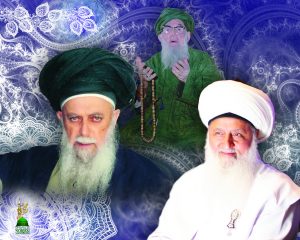 Das gesamte Konzept des madad (der spirituellen Unterstützung) basiert darauf, Dich aus der Gleichung vollkommen herauszunehmen. Ich bin nichts, ich bin nichts und je mehr ich das wirklich glaube, dass ich nichts bin, desto mehr scheint das Licht der Heiligen auf dich. Das ist die Quintessenz von: Atiullaha wa atiur Rasula wa Ulil amre minkum.
Das gesamte Konzept des madad (der spirituellen Unterstützung) basiert darauf, Dich aus der Gleichung vollkommen herauszunehmen. Ich bin nichts, ich bin nichts und je mehr ich das wirklich glaube, dass ich nichts bin, desto mehr scheint das Licht der Heiligen auf dich. Das ist die Quintessenz von: Atiullaha wa atiur Rasula wa Ulil amre minkum.
﴾ياأَيُّهَا الَّذِينَ آمَنُوا أَطِيعُواللَّه وَأَطِيعُوٱلرَّسُولَ وَأُوْلِي الْأَمْرِ مِنْكُمْ…﴿٥٩
4:59 – “Ya ayyu hal latheena amanoo Atiullaha wa atiur Rasola wa Ulil amre minkum…” (Surat An-Nisa)
„O, die ihr glaubt, gehorcht Allah und gehorcht dem Gesandten und den Befehlshabern/ den Verantwortlichen unter euch!“ (Quran, Die Frauen, Sure 4, Vers 59)
Allah (AJ) fordert uns also auf, Ihm, dem Wege von Sayyidina Muhammad ﷺ und den ulul amr (Heiligen) zu gehorchen. Die wahren ulul amr (Heiligen) erhalten dabei faiz (permanenten Segen) von Sayyidina Muhammad ﷺ und sie übertragen diese Energie, ja, senden sie aus. Dabei sind wir wie Mobiltelefone, denn wir sollen diese gesegnete Energie empfangen. Wollen wir diese Energie verstärken, so gilt es von besonders gutem Charakter und Benehmen zu sein. Denn durch guten Charakter und gutes Benehmen ziehen wir Gottes Anmut und Gnade auf uns und dann ist Allah (AJ) zufrieden mit uns.
Light of Awliya Shine Upon Us When We Believe We Are Nothing
The whole concept of the madad (support) is that to take myself out of the equation. I’m nothing, I’m nothing; if I really believe I’m nothing then their light will begin to shine through. This is from Atiullaha wa atiur Rasula wa Ulil amre minkum.
﴾ياأَيُّهَا الَّذِينَ آمَنُوا أَطِيعُواللَّه وَأَطِيعُوٱلرَّسُولَ وَأُوْلِي الْأَمْرِ مِنْكُمْ…﴿٥٩
4:59 – “Ya ayyu hal latheena amanoo Atiullaha wa atiur Rasola wa Ulil amre minkum…” (Surat An-Nisa)
“O You who have believed, Obey Allah, Obey the Messenger, and those in authority among you…” (The Women, 4:59)
That Allah (AJ) asked us to be obedient to Allah (AJ), to follow the way. Follow the way of Sayyidina Muhammad ﷺ and follow the way of the ulul amr (saints). The real ulul amr that are inheriting that faiz (downpouring blessings) from Sayyidina Muhammad ﷺ and they begin to broadcast that energy out. And we are all like mobile phones. If we can connect with that energy and that’s why they teach that the connection – if you want it stronger, have good character, have good manners. The good character and the manners bring God’s grace, Allah (AJ) to be happy with us.
Wenn Dein Herz verdorben ist, ist alle Liebe für Dich vergebens
 Wir sprechen zu Tausenden von Menschen, von denen die meisten keine Muslime sind, um sie mit der Dimension des Islam vertraut zu machen. Das bedeutet, dass es nicht unser Ziel ist, die Menschen zu Arabern zu machen. Wir sehen unseren Auftrag darin, Menschen so über unsere Religion zu unterweisen, dass sie sie auch verstehen. Das bedeutet, dass Allahs (AJ) rahmah (Barmherzigkeit) und Gnade göttliche Gnade ist. Und diese göttliche Gnade schützt uns vor schlechten Eigenschaften/ Charakter. Du kannst sicherlih behaupten, dass Du Jesus (as) liebst, aber wenn dein Herz verdorben ist, ist alle Liebe für dich vergebens. Du kannst auch behaupten, dass du für Sayyidina Muhammad ﷺ Liebe empfindest, aber wenn Dein Herz verdorben ist, dann kannst du nicht wirklich lieben. Wenn du aufrichtig liebst, würdest Du von gutem Charakter sein. Derjenige, der über einen guten Charakter verfügt, hat eine sanfte Zunge mit guten Worten. Wenn der Charakter gut ist, so beweist das, dass Allah (AJ) in seiner Gnade, Anmut und Rahma (Barmherzigkeit) dem Diener diesen Charakter schenkt. Es bedeutet, dass Allah (AJ) zufrieden mit diesem Menschen ist.
Wir sprechen zu Tausenden von Menschen, von denen die meisten keine Muslime sind, um sie mit der Dimension des Islam vertraut zu machen. Das bedeutet, dass es nicht unser Ziel ist, die Menschen zu Arabern zu machen. Wir sehen unseren Auftrag darin, Menschen so über unsere Religion zu unterweisen, dass sie sie auch verstehen. Das bedeutet, dass Allahs (AJ) rahmah (Barmherzigkeit) und Gnade göttliche Gnade ist. Und diese göttliche Gnade schützt uns vor schlechten Eigenschaften/ Charakter. Du kannst sicherlih behaupten, dass Du Jesus (as) liebst, aber wenn dein Herz verdorben ist, ist alle Liebe für dich vergebens. Du kannst auch behaupten, dass du für Sayyidina Muhammad ﷺ Liebe empfindest, aber wenn Dein Herz verdorben ist, dann kannst du nicht wirklich lieben. Wenn du aufrichtig liebst, würdest Du von gutem Charakter sein. Derjenige, der über einen guten Charakter verfügt, hat eine sanfte Zunge mit guten Worten. Wenn der Charakter gut ist, so beweist das, dass Allah (AJ) in seiner Gnade, Anmut und Rahma (Barmherzigkeit) dem Diener diesen Charakter schenkt. Es bedeutet, dass Allah (AJ) zufrieden mit diesem Menschen ist.
If Your Heart is Rotten, Love is Wasted For You
We’re talking to audiences of thousands of people, most of which are not Muslim and coming towards the reality of Islam. So, means we’re not here to make people to be Arabs. We’re here to teach people from our religion in words and in understandings that they understand. It means Allah’s (AJ) Rahmah and Grace is Divine Grace. This Divine Grace doesn’t dress us with bad character. You can say you love Jesus but if you’re rotten in your heart, that love is wasted for you. You can say you love Sayyidina Muhammad ﷺ but your heart is rotten, it’s wasted for you because then you truly don’t love. If you really love, you would have good character. Anyone with good character has a soft tongue. If that character is good, Allah’s (AJ) Grace is dressing, Rahmah (mercy) dressing. Allah’s (AJ) happy and satisfied with them.
Allah (AJ) erweist uns seine Barmherzigkeit, indem der uns gute Taten verrichten lässt
 Wenn Allah (AJ) Dich liebt und zufrieden mit Dir ist, lässt er dich Taten verrichten, mit denen Er zufrieden ist. Dadurch zeigt er Seine Barmherzigkeit. Allah (AJ) sagt dann: “Ich bin wirklich zufrieden mit Dir. Ich finde Gefallen an deinem Charakter und deinen Eigenschaften. Ich werde Dich gute Taten verrichten lassen, die zu Deinem Charakter passen, sodass niemand Anstoß an dir oder Deinen Taten findet, weil ich dich liebe. “Salaamun qawlam mir Rabbir Raheem.”
Wenn Allah (AJ) Dich liebt und zufrieden mit Dir ist, lässt er dich Taten verrichten, mit denen Er zufrieden ist. Dadurch zeigt er Seine Barmherzigkeit. Allah (AJ) sagt dann: “Ich bin wirklich zufrieden mit Dir. Ich finde Gefallen an deinem Charakter und deinen Eigenschaften. Ich werde Dich gute Taten verrichten lassen, die zu Deinem Charakter passen, sodass niemand Anstoß an dir oder Deinen Taten findet, weil ich dich liebe. “Salaamun qawlam mir Rabbir Raheem.”
﴾سَلَامٌ قَوْلًا مِّن رَّبٍّ رَّحِيمٍ ﴿٥٨
36:58 – “Salamun qawlam mir Rabbir Raheem.” (Surat YaSeen)
“Friede!”, als (Gruß)wort von einem barmherzigen Herrn. (Qur-An, YaSeen, Sure 36, Vers 58)
‘Salaams (meine Grüße) richte ich Dir aus und lasse sie dir zukommen. Ich bin zufrieden mit Deinem Charakter und Deinem khuluq (Charakter des Anstandes). Ich bin zufrieden mit Deinen Eigenschaften und Deiner muhabbat (Liebe), auch wenn Deine Taten schwach sein mögen, werde ich sie in starke Taten verwandeln, damit meine Schöpfung verblüfft und erstaunt ist über Dich.
Allah (AJ) is Merciful By Giving Us Good Actions
When Allah (AJ) loves you and is satisfied with you, He gives you actions that He will be pleased with, that’s His Mercy. When He says, ‘I’m really happy with you. I really like your character. I’m happy with your character. I’m going to give you actions that match so that My creation won’t be judging you because I love you.’ Salaamun qawlam mir Rabbir Raheem.
﴾سَلَامٌ قَوْلًا مِّن رَّبٍّ رَّحِيمٍ ﴿٥٨
36:58 – “Salamun qawlam mir Rabbir Raheem.” (Surat YaSeen)
“Peace,” a word from a Merciful Lord. (YaSeen, 36:58)
‘Salaams (greetings) from Me is coming upon you. I’m happy with your khuluq (character). I’m happy with your characteristics and your muhabbat (love) and you may be weak on your actions but I’ll make your actions to be strong. So, that My creation will be astonished to who you are.’
Die Engel werden gesandt, um gute Taten im unseren Namen zu verrichten
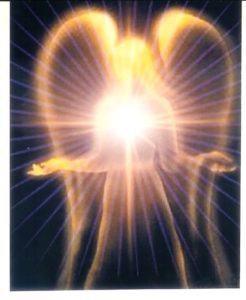 Zu glauben, dass wir schier unglaubliche Taten verrichten können mit denen Allah (AJ) glücklich sein wird, ist nicht die richtige Denkweise. Nein! Vielmehr geht es darum, uns Allah (AJ) mit muhabbat (Liebe) zu nähern und so wird Allah (AJ) alles wunderschön für uns gestalten. Auch der awliyaullah (Heilige) Shaykh Daghestani (Q), hat bereits verkündet, dass einen Engel erschaffen wird, der die besten Taten, unvorstellbare Gebete verrichten und unvorstellbar schöne Fürbitten aussprechen wird. Einzig und allein für den Diener. Und all diese amal Taten werden dem Diener angerechnet. Allah (AJ) ist groß. Sag’ nicht, dass Allah (AJ) dies nicht machen könnte- vielmehr kann Allah (AJ) alles tun, was ihm beliebt.
Zu glauben, dass wir schier unglaubliche Taten verrichten können mit denen Allah (AJ) glücklich sein wird, ist nicht die richtige Denkweise. Nein! Vielmehr geht es darum, uns Allah (AJ) mit muhabbat (Liebe) zu nähern und so wird Allah (AJ) alles wunderschön für uns gestalten. Auch der awliyaullah (Heilige) Shaykh Daghestani (Q), hat bereits verkündet, dass einen Engel erschaffen wird, der die besten Taten, unvorstellbare Gebete verrichten und unvorstellbar schöne Fürbitten aussprechen wird. Einzig und allein für den Diener. Und all diese amal Taten werden dem Diener angerechnet. Allah (AJ) ist groß. Sag’ nicht, dass Allah (AJ) dies nicht machen könnte- vielmehr kann Allah (AJ) alles tun, was ihm beliebt.
Angels Are Sent To Do Good Deeds On Our Behalf
Is Allah (AJ) Almighty versus the reverse way; think like I’m going to do like amazing actions that God will be happy with? No! They taught us, no, come with this muhabbat and love and Allah (AJ) will make everything to be beautiful. Even awliyaullah Shaykh Daghestani (Q) said that, ‘Allah (AJ) will make an angel and put that angel just to do amal (good deeds) on your behalf. And the angel will pray prayers that nobody could imagine, make duas (supplications) that nobody could imagine. And all the amal (good deeds) of the angel will be written upon the servant.’ Allah’s (AJ) great. You can’t say, ‘No, Allah (AJ) can’t do that.’ Allah (AJ) can do whatever Allah (AJ) wants to do.
Wir unterdrücken uns selbst
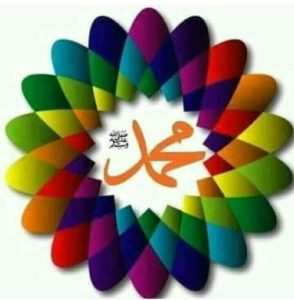 Begrenze nicht Allahs (AJ) Majestät, Anmut und Gnade, denn alles, was wir brauchen liegt in einem guten Charakter verborgen. Und mit diesem guten Charakter kommen wir an der Türschwelle und sagen aufrichtig: „Ich bin ichts, ich bin nichts. Ich habe mich selber wirklich satt. Ich ertrage meinen schlechten Charakter, mein Mundwerk und meine Zunge nicht mehr. Immerzu hetze ich und bin verärgert. Wenn Du wirklich sagst und aufrichtig meinst: la ilaha illaa Anta Subhanaka innee kuntu minaz zaalimeen. Die Ehre, der Ruhm ,die Herrlichkeit- sie alle gehören Gott allein und ich bin ein Unterdrücker meiner selbst:
Begrenze nicht Allahs (AJ) Majestät, Anmut und Gnade, denn alles, was wir brauchen liegt in einem guten Charakter verborgen. Und mit diesem guten Charakter kommen wir an der Türschwelle und sagen aufrichtig: „Ich bin ichts, ich bin nichts. Ich habe mich selber wirklich satt. Ich ertrage meinen schlechten Charakter, mein Mundwerk und meine Zunge nicht mehr. Immerzu hetze ich und bin verärgert. Wenn Du wirklich sagst und aufrichtig meinst: la ilaha illaa Anta Subhanaka innee kuntu minaz zaalimeen. Die Ehre, der Ruhm ,die Herrlichkeit- sie alle gehören Gott allein und ich bin ein Unterdrücker meiner selbst:
﴾وَذَا النُّونِ إِذ ذَّهَبَ مُغَاضِبًا فَظَنَّ أَن لَّن نَّقْدِرَ عَلَيْهِ فَنَادَىٰ فِي الظُّلُمَاتِ أَن لَّا إِلَـٰهَ إِلَّا أَنتَ سُبْحَانَكَ إِنِّي كُنتُ مِنَ الظَّالِمِينَ ﴿٨٧
21:87 – “Wa Zan Nooni idh dhahaba mughadiban fazhanna al lan naqdira ‘alayhi fanada fizh zhulumati an la ilaha illa anta Subhanaka, innee kuntu minazh zhalimeen.”
“Und (auch) dem Mann mit dem Fisch, als er erzürnt wegging. Da meinte er, Wir würden ihm nicht (den Lebensunterhalt) bemessen. Dann rief er in den Finsternissen:” Es gibt keinen Gott außer Dir! Preis sei Dir! Gewiß, ich gehöre zu den Ungerechten.“ (Qur-an, Die Propheten, Sure 21, Vers 87)
Wenn ich jeden Tag diese Sure aus dem heiligen Qur-an rezitiere, beginne ich sie immer mehr zu internalisieren, zu verinnerlichen und damit zu glauben, dass ich nichts bin. Diese Welt hat mich in die Irre geführt und ich wurde als Werkzeug benutzt. Nein, ich bin nichts, ich bin nichts, mein Herr.
Wenn Du diesen Zustand des Nichts erreichst, dann wird Allah (AJ) dein Herz mit seiner Rahmah (Barmherzigkeit) und Gnade kleiden. Nur also, wenn ich mich als nichts begreife und gelernt habe, mein madad (meine Bitte um spirituellen Beistand) durchführe, wird das gelingen.
We Are Oppressors to Ourselves
It means don’t limit Allah’s (AJ) Majesty and Grace but all it took was good character so with good character we came to the door and said I’m nothing, I’m nothing, I’m truly sick of myself. I’m truly sick of my bad characteristic, my bad mouth. I agitate and aggravate. When you truly identify la ilaha illaa Anta Subhanaka innee kuntu minaz zaalimeen. That glory be to God and I’m an oppressor to myself.
﴾وَذَا النُّونِ إِذ ذَّهَبَ مُغَاضِبًا فَظَنَّ أَن لَّن نَّقْدِرَ عَلَيْهِ فَنَادَىٰ فِي الظُّلُمَاتِ أَن لَّا إِلَـٰهَ إِلَّا أَنتَ سُبْحَانَكَ إِنِّي كُنتُ مِنَ الظَّالِمِينَ ﴿٨٧
21:87 – “Wa Zan Nooni idh dhahaba mughadiban fazhanna al lan naqdira ‘alayhi fanada fizh zhulumati an la ilaha illa anta Subhanaka, innee kuntu minazh zhalimeen. (Surat Al-Anbiya)
“And [mention] Zulnun [Yunus (Jonah) (as)], when he went off in anger and thought that We had no power/decree over him! But he cried out through the depths of darkness, “There is no god/diety except You; Glory to you: Indeed I have been of the wrongdoers/Oppressor to Myself!” (The Prophets, 21:87)
If every day I say that ayat al-Kareem (verse of holy Qur’an) and keep saying to myself, saying to myself, at some point you begin to believe I’m nothing. This world has fooled me and everybody has used me as a tool and I’m nothing, I’m nothing, my lord. If you reach that state of nothingness Allah’s (AJ) Rahmah and Mercy begins to dress upon your heart. If I’m nothing and then they taught me how to make my madad (support), how to make my connection.
Wir stehen unter dem Nazar von Nabiyeen, Siddiqeen, Shuhada and Saliheen
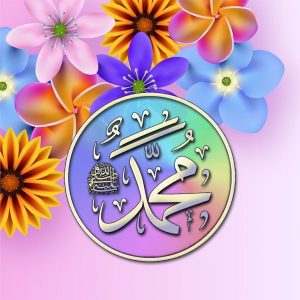 Ich möchte nicht gehen, denn ich „durchschreite wirklich das Tal des Todes, aber ich weiß, dass ich nicht allein bin.“ In jedem der heiligen Bücher heißt es:“ (…), weil ich weiß, dass ich nicht allein bin.“ „Natürlich bin ich bei dir und viele der saliheen (die Rechtschaffenen) folgen dir. Allah (AJ) sagt weiter: “Die nabiyeen (Propheten) sehen Dich, die siddiqeen (die Wahrheitsliebenden) sehen Dich und die shuhada (die Zeugen) sehen dich, weil ich Dich liebe.
Ich möchte nicht gehen, denn ich „durchschreite wirklich das Tal des Todes, aber ich weiß, dass ich nicht allein bin.“ In jedem der heiligen Bücher heißt es:“ (…), weil ich weiß, dass ich nicht allein bin.“ „Natürlich bin ich bei dir und viele der saliheen (die Rechtschaffenen) folgen dir. Allah (AJ) sagt weiter: “Die nabiyeen (Propheten) sehen Dich, die siddiqeen (die Wahrheitsliebenden) sehen Dich und die shuhada (die Zeugen) sehen dich, weil ich Dich liebe.
﴾وَمَن يُطِعِ اللّهَ وَالرَّسُولَ فَأُوْلَـئِكَ مَعَ الَّذِينَ أَنْعَمَ اللّهُ عَلَيْهِم مِّنَ النَّبِيِّينَ وَالصِّدِّيقِينَ وَالشُّهَدَاء وَالصَّالِحِينَ وَحَسُنَ أُولَـئِكَ رَفِيقًا ﴿٦٩
4:69 – “Wa man yuti’ Allaha war Rasula faolayeka ma’al ladheena an’ama Allahu ‘alayhim minan Nabiyeena, was Siddiqeena, wash Shuhadai, was Saliheena wa hasuna olayeka rafeeqan.” (Surat An-Nisa)
“Wer Allah und dem Gesandten gehorcht, die werden mit denjenigen von den Propheten, den Wahrheitsliebenden , den Märtyrern und den Rechtschaffenen zusammensein, denen Allah Gunst erwiesen hat. Welch gute Gefährten jene sind! (Qur-an, Sure 4, Vers 69)
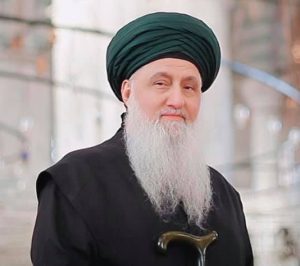 Sie schauen uns also zu und nehmen uns wahr. Sobald wir unser tafakkur (spirituelle Kontemplation) beginnen und sagen: „Ich bin nichts. Ich bin nichts.”, inspiriert uns Allah (AJ) ittaqollaha wa kono ma’as sadiqeen. Agiert in vollem Bewusstsein und seid mit meinen wahrheitsliebenden Dienern, die wahrheitsliebend in ihrem Charakter und ihren Taten sind.
Sie schauen uns also zu und nehmen uns wahr. Sobald wir unser tafakkur (spirituelle Kontemplation) beginnen und sagen: „Ich bin nichts. Ich bin nichts.”, inspiriert uns Allah (AJ) ittaqollaha wa kono ma’as sadiqeen. Agiert in vollem Bewusstsein und seid mit meinen wahrheitsliebenden Dienern, die wahrheitsliebend in ihrem Charakter und ihren Taten sind.
﴾يَا أَيُّهَا الَّذِينَ آمَنُوا اتَّقُوا اللّهَ وَكُونُوا مَعَ الصَّادِقِينَ ﴿١١٩
9:119 – “Ya ayyuhal ladheena amanoo ittaqollaha wa kono ma’as sadiqeen.” (Surat At-Tawba)
“O ihr, die ihr glaubt, fürchtet Allah und seid mit den Wahrhaftigen!“ (Qur-an, Die Reue, Sure 9, Vers 119)
We Are Under the Nazar of Nabiyeen, Siddiqeen, Shuhada and Saliheen
That I don’t want to go, ‘for verily I walk through the valley of death and I know that I’m not alone’. Every book says, for I know my lord is with me and Allah (AJ) says, ‘Of course you’re with me. You’re with me and I have many of the saliheen following you. I have nabiyeen (prophets) watching you, siddiqeen (truthful) watching you, saliheen (righteous) watching you, shuhada (witnesses) watching you, because I love you”.
﴾وَمَن يُطِعِ اللّهَ وَالرَّسُولَ فَأُوْلَـئِكَ مَعَ الَّذِينَ أَنْعَمَ اللّهُ عَلَيْهِم مِّنَ النَّبِيِّينَ وَالصِّدِّيقِينَ وَالشُّهَدَاء وَالصَّالِحِينَ وَحَسُنَ أُولَـئِكَ رَفِيقًا ﴿٦٩
4:69 – “Wa man yuti’ Allaha war Rasula faolayeka ma’al ladheena an’ama Allahu ‘alayhim minan Nabiyeena, was Siddiqeena, wash Shuhadai, was Saliheena wa hasuna olayeka rafeeqan.” (Surat An-Nisa)
“And whoever obeys Allah and the Messenger (pbuh) are in the company of those on whom Allah has bestowed His Favours/Blessings – of the prophets, the sincere Truthful, the witnesses (who testify), and the Righteous, and excellent are those as companions.” (The Women, 4:69)
So, they’re watching. So, as soon as we make our tafakkur (contemplation), I’m nothing, I’m nothing then Allah (AJ) ittaqollaha wa kono ma’as sadiqeen. Have a consciousness and accompany my truthful servants, truthful in their deeds and in their character.
﴾يَا أَيُّهَا الَّذِينَ آمَنُوا اتَّقُوا اللّهَ وَكُونُوا مَعَ الصَّادِقِينَ ﴿١١٩
9:119 – “Ya ayyuhal ladheena amanoo ittaqollaha wa kono ma’as sadiqeen.” (Surat At-Tawba)
“O you who have believed, have consciousness of Allah and be with those who are truthful/ Pious /sincere (in words and deed).” (The Repentance, 9:119)
Rahman ist mächtiger als Shaytan
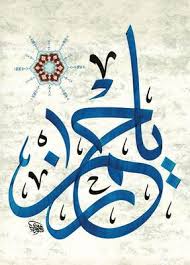 Folge ihnen spirituell. Auch wenn du nicht physisch beim Shaykh sein kannst. Und wenn Du Dich fragst, wie ein Heiliger an verschiedenen Orten sein kann, dann, weil dieser Mensch sein Licht multiplizieren kann. Dadurch kann er überall sein. Das ist ein Leichtes. Allahs (AJ) Macht und Majestät, die Realität der Seele, jeder glaubt, dass der shaitan (der Satan) überall wäre. Wahr hingegen ist, dass der rahman (der Mildtätige) unendlich mächtiger ist. Sayyidina Muhammad ﷺ ist überall, die awliyaullah (Heiligen) sind überall. Assalamu ‘alaika ayyuhan-nabi wa ‘ibaadillaahis saa’liheen.
Folge ihnen spirituell. Auch wenn du nicht physisch beim Shaykh sein kannst. Und wenn Du Dich fragst, wie ein Heiliger an verschiedenen Orten sein kann, dann, weil dieser Mensch sein Licht multiplizieren kann. Dadurch kann er überall sein. Das ist ein Leichtes. Allahs (AJ) Macht und Majestät, die Realität der Seele, jeder glaubt, dass der shaitan (der Satan) überall wäre. Wahr hingegen ist, dass der rahman (der Mildtätige) unendlich mächtiger ist. Sayyidina Muhammad ﷺ ist überall, die awliyaullah (Heiligen) sind überall. Assalamu ‘alaika ayyuhan-nabi wa ‘ibaadillaahis saa’liheen.
التَّحِيَّاتُ لِلّٰهِ وَالصَّلَوَاتُ وَالطَّيِّبَاتُ، اَلسَّلَامُ عَلَيْكَ أَيُّهَا النَّبِيُّ وَرَحْمَةُ اللهِ وَبَرَكَاتُهُ، اَلسَّلَامُ عَلَيْنَا وَ عَلٰى عِبَادِ اللهِ الصَّالِحِيْنَ، أَشْهَدُ أَنْ لَا إِلٰهَ إِلَّا اللهُ، وَأَشْهَدُ أَنَّ مُحَمَّدًا عَبْدُهُ وَ رَسُوْلُهُ
“At-tahiyyatu lillahi, was-salawatu wat-tayyibatu, as-salamu ‘alayka, ayyuhan-nabiyyu wa rahmatullahi wa barakatuh, as-salamu ‘alayna wa ‘ala ‘ibadillahis-saliheen. Ashhadu an la ilaha illallahu wa ashhadu anna Muhammadan ‘abduhu wa Rasuluh.”
“Grüße an Gott und Gebete und gute Taten. Friede sei mit dir, o Prophet, und die Barmherzigkeit Gottes und Sein Segen. Friede sei mit uns und den gerechten Dienern Gottes. Ich bezeuge, dass es keinen Gott außer Allah gibt, und ich bezeuge, dass Mohammed sein Diener und sein Gesandter ist.”
Das sagen wir in jedem Gebet. Wir schenken Sayyidina Muhammad ﷺ salaams, und zwar in der Gegenwart, nicht der Vergangenheit wa‘ibaadillaahis saa’liheen. Diese saliheen (righteous) sind alle und immer mit Sayyidina Muhammad ﷺ.
Rahman is More Powerful Than Shaitan
Soon as you accompany them, not physically – spiritually. You don’t have to always be around the shaykh, it’s impossible. How can one personality be everywhere physically? But he can multiply himself through his students and his light can be everywhere. It’s not something difficult. Allah’s (AJ) might and majesty, the reality of the soul, everybody believes shaitan (satan) is everywhere. Rahman (the Beneficent) is more powerful! Sayyidina Muhammad ﷺ is everywhere, awliyaullah (saints) are everywhere. Assalamu ‘alaika ayyuhan-nabi wa ‘ibaadillaahis saa’liheen.
التَّحِيَّاتُ لِلّٰهِ وَالصَّلَوَاتُ وَالطَّيِّبَاتُ، اَلسَّلَامُ عَلَيْكَ أَيُّهَا النَّبِيُّ وَرَحْمَةُ اللهِ وَبَرَكَاتُهُ، اَلسَّلَامُ عَلَيْنَا وَ عَلٰى عِبَادِ اللهِ الصَّالِحِيْنَ، أَشْهَدُ أَنْ لَا إِلٰهَ إِلَّا اللهُ، وَأَشْهَدُ أَنَّ مُحَمَّدًا عَبْدُهُ وَ رَسُوْلُهُ
“At-tahiyyatu lillahi, was-salawatu wat-tayyibatu, as-salamu ‘alayka, ayyuhan-nabiyyu wa rahmatullahi wa barakatuh, as-salamu ‘alayna wa ‘ala ‘ibadillahis-saliheen. Ashhadu an la ilaha illallahu wa ashhadu anna Muhammadan ‘abduhu wa Rasuluh.”
“Salutations to God and prayers and good deeds. Peace be upon you, O Prophet, and the mercy of God and his blessings. Peace be on us and on the righteous servants of God. I bear witness that there is no god but Allah, and I bear witness that Muhammad is His servant and His messenger.”
We say it in every prayer. We give the salaams to Sayyidina Muhammad ﷺ in present tense wa‘ibaadillaahis saa’liheen. These saliheen (righteous) whom are all and always with Sayyidina Muhammad ﷺ.
Baue Deinen Glauben durch Tafakkur auf
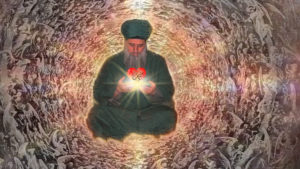 Sobald ich nichts bin, beginne ich mein tafakkur (spirituelle Kontemplation). Ich bitte Ya Rabbi lass mich bei und mit Dir sein. Erlaube mir zu sagen: „Assalamu ‘alaika Sayeddi Ya Rasul e kareem Ya Habeeb al Azeem. (Friede sei mit Dir, o Du großzügiger Prophet, Du Geliebter des Großartigsten.) Ich muss nicht sehen, dass ich nichts bin. Ich bin niemand, Ya ibaadillaahis saa’liheen, (O ihr rechtschaffenen Diener), richtet euren Blick auf mich. Wahrlich, ich bin ein schwacher Diener. Weil Allah (AJ) Euch Geschenke und Segen verschiedener Art hat zukommen lassen, schaut mich mit einem Blick des Mitgefühls an.
Sobald ich nichts bin, beginne ich mein tafakkur (spirituelle Kontemplation). Ich bitte Ya Rabbi lass mich bei und mit Dir sein. Erlaube mir zu sagen: „Assalamu ‘alaika Sayeddi Ya Rasul e kareem Ya Habeeb al Azeem. (Friede sei mit Dir, o Du großzügiger Prophet, Du Geliebter des Großartigsten.) Ich muss nicht sehen, dass ich nichts bin. Ich bin niemand, Ya ibaadillaahis saa’liheen, (O ihr rechtschaffenen Diener), richtet euren Blick auf mich. Wahrlich, ich bin ein schwacher Diener. Weil Allah (AJ) Euch Geschenke und Segen verschiedener Art hat zukommen lassen, schaut mich mit einem Blick des Mitgefühls an.
Wenn Du aufrichtig darum bittest und Allah (AJ) aufrichtig darum bittest, wird Er dir khashf (ein spirituelles Sehvermögen) in Deinem Herzen schenken. Dann wird dein Herz beginnen zu sehen, dass sie direkt vor dir stehen und Du wirst mit dem Auge Deines iman (Glaubens), nicht mit Deinem physischen Auge, aber durch Deinen GlaubenDu siehst, dass sie da und mit Dir sind. Und sag: “Ya ibaadillaahis saa’liheen! Ich bin nichts, ich bin nichts. Bitte um madad, lies den madad (die Fürbitte um spirituelle Unterstützung) der Shaykhs, dass ich nichts bin und dass sie mich sehen. Bitte darum, mit faiz (anhaltendem Segen) gekleidet und gesegnet zu werden.
Build Your Faith Through Tafakkur
So, as soon as I’m nothing, I’m making my tafakkur (contemplation). I’m asking Ya Rabbi let me to be with your being. Let me say Assalamu ‘alaika Syeddi Ya Rasul e kareem Ya Habeeb al Azeem. I don’t need to see I’m nothing, I’m no one, Ya ibaadillaahis saa’liheen, please keep your nazar (gaze) upon me. I’m a weak servant. As Allah (AJ) gave you gifts and blessings, look upon me with your pity. If you are sincerely asking and sincerely asking Allah (AJ) begin to open a khashf (spiritual vision) in your heart. That your heart will begin to see that they’re right there in front of you and you see with the eye of your iman (faith), not the eye of your physical eyes but with your faith. You see that they’re there and present with you. And say Ya ibaadillaahis saa’liheen I’m nothing, I’m nothing. Make the madad, read the madad (support) of the shaykhs that I’m nothing and that they’re watching me. That dress me and bless me with your faiz (downpouring blessings).
Haltet alle fest am Seil Allahs (AJ)
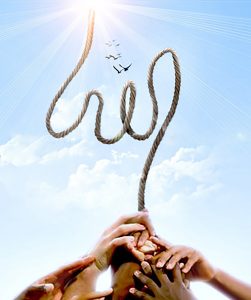 Die Anbetung gebührt nur Allah (AJ) allein, aber Allahs (AJ) Gebot ist: wa kono ma’as sadiqeen (Qur’an, Die Reue, Sure 9, Vers 119). „O ihr, die ihr glaubt, fürchtet Allah und seid mit den Wahrhaftigen!“
Die Anbetung gebührt nur Allah (AJ) allein, aber Allahs (AJ) Gebot ist: wa kono ma’as sadiqeen (Qur’an, Die Reue, Sure 9, Vers 119). „O ihr, die ihr glaubt, fürchtet Allah und seid mit den Wahrhaftigen!“
Sei stets mit dem sadiq. Wa atasimoo bihabliAllahi, lasse niemals, niemals, niemals los! Haltet alle fest am Seil Allahs (AJ)!
﴾وَاعْتَصِمُوا بِحَبْلِ اللَّـهِ جَمِيعًا وَلَا تَفَرَّقُوا ۚ ﴿١٠٣
3:103 – “Wa’tasimo bihab lillahi jamee’an wa la tafarraqo…” (Surat Ali-Imran)
“Und haltet alle fest am Seil Allahs und geht nicht auseinander!” (Qur-an, Die Sippe Imrans, Sure 3, Vers 103)
Sobald sie also am Seil festhalten, ist das Spirituelle wichtiger als das Physische.
Also sehen sie sich in dieser Gegenwart und bitten darum, nichts zu sein, das dein faiz (strömender Segen) und das Licht mich kleidet, und sie beginnen, das Licht und die Energie zu fühlen, die sie anziehen und segnen, und ihr ganzes Leben geht es um diese Verbindung. Je mehr du lernst, von dieser Realität angezogen und gesegnet zu werden, desto mehr beginnt dein Glaube real zu werden. Der Islam ist keine getrocknete Frucht und keine gefälschte Wachsfrucht. Sie sollten das Gefühl haben, dass der Islam und der Ozean des imans (Glaubens) eine immense Macht und Energie sind. Es bedeutet aus jeder Richtung, wenn sie atmen, dass sie Energie atmen. Aus jeder Richtung sendet Allah (AJ) ins Herz. Alles lebt und alles hat einen Zikr, alles hat einen Duft. Dieser Maqamul Iman (Station des Glaubens) ist eine immense Öffnung von Allah (AJ). Und es ist keine Plastikfrucht.
Hold Tight to the Rope of Allah (AJ)
Worshipness is only for Allah (AJ) but Allah (AJ) order was what wa kono ma’as sadiqeen (Qur’an, 9:119), keep the company of the sadiq. WaAAtasimoo bihabliAllahi, don’t, don’t, don’t break away, hold tight to the rope of Allah (AJ).
﴾وَاعْتَصِمُوا بِحَبْلِ اللَّـهِ جَمِيعًا وَلَا تَفَرَّقُوا ۚ ﴿١٠٣
3:103 – “Wa’tasimo bihab lillahi jamee’an wa la tafarraqo…” (Surat Ali-Imran)
“And hold firmly to the rope of Allah all together and do not separate…” (Family of Imran, 3:103)
So, as soon as they’re holding, spiritual is more important than physical. So, they see themselves in that presence and asking to be nothing that dress your faiz (downpouring blessings) and light upon me and they begin to feel the light and the energy that is dressing them and blessing them and their whole life was about that connection. As much as you learn to be dressed and blessed by this reality, as much as you begin to make your faith to be real. Islam is not dried fruits and is not a fake wax fruit. You should be feeling the Islam and the ocean of iman (faith) is immense power. It means from every direction when they’re breathing, they’re breathing energy. From every direction, Allah (AJ) is sending into the heart. Everything is alive and everything has a zikr, everything has a fragrance. This maqamul Iman (station of faith) is an immense opening from Allah (AJ). It’s not plastic fruit.
Tafakkur ist die Tür zur Seel
 Es muss so viel geöffnet werden, aber es öffnet sich nur durch die Tür von Tafakkur (Kontemplation). Es ist die Tür der Seele. Wenn Allah (AJ) sagt: “Betritt das Haus durch die richtige Tür”, ist es die Tür der Seele aus dem Malakut (himmlisches Reich).
Es muss so viel geöffnet werden, aber es öffnet sich nur durch die Tür von Tafakkur (Kontemplation). Es ist die Tür der Seele. Wenn Allah (AJ) sagt: “Betritt das Haus durch die richtige Tür”, ist es die Tür der Seele aus dem Malakut (himmlisches Reich).
﴾وَلَيْسَ الْبِرُّ بِأَن تَأْتُوا الْبُيُوتَ مِن ظُهُورِهَا وَلَـٰكِنَّ الْبِرَّ مَنِ اتَّقَىٰ ۗ وَأْتُوا الْبُيُوتَ مِنْ أَبْوَابِهَا ۚ وَاتَّقُوا اللَّـهَ لَعَلَّكُمْ تُفْلِحُونَ ﴿١٨٩…
2:189 – “…Wa laysal birru bi-an tatol buyoota min zuhooriha wa lakinnal birra manit taqa, wa’ tol buyoota min abwabiha, wat taqollaha la’allakum tuflihoon.” (Surat Al-Baqarah)
“…Und nicht darin besteht die Frömmigkeit, dass ihr von der Rückseite in die Häuser kommt. Frömmigkeit besteht vielmehr darin, dass man gottesfürchtig ist. So kommt durch die Türen in die Häuser und fürchtet Allah, auf dass es euch wohl ergehen möge.” (Qur- an, Die Kuh, Sure 2, Vers 189)
Tafakkur is the Door to the Soul
There’s so much that has to be opened but it opens only through the door of tafakkur (contemplation). It’s the door of the soul. When Allah (AJ) says, ‘Enter the house through the proper door’, it’s the door of the soul from malakut (heavenly realm).
﴾وَلَيْسَ الْبِرُّ بِأَن تَأْتُوا الْبُيُوتَ مِن ظُهُورِهَا وَلَـٰكِنَّ الْبِرَّ مَنِ اتَّقَىٰ ۗ وَأْتُوا الْبُيُوتَ مِنْ أَبْوَابِهَا ۚ وَاتَّقُوا اللَّـهَ لَعَلَّكُمْ تُفْلِحُونَ ﴿١٨٩…
2:189 – “…Wa laysal birru bi-an tatol buyoota min zuhooriha wa lakinnal birra manit taqa, wa’ tol buyoota min abwabiha, wat taqollaha la’allakum tuflihoon.” (Surat Al-Baqarah)
“…And it is not righteousness to enter houses from the back, but righteousness is [in] one who fears Allah. And enter houses from their doors. And be Conscious of Allah that you may succeed.” (The Cow, 2:189)
Awliya leiten dein Herz zu einem Ozean des Lichts
 Du musst dich mit deiner Seele verbinden, dass ich nichts bin und dass mein Shaykh vor mir ist. Ich bin nichts und das faiz (anhaltend strömender Segen) meines Shaykhs beginnt mich anzuziehen. Dies wird durch spirituelle Verbindungen zu einem verschlüsselten Kanal, und das ist wichtig. Sie werden Ihren Glauben nicht vom Fernsehen nehmen und sie werden ihre Koordinaten nicht vom Fernsehen erhalten. Und so wirst du beginnen, durch die Dunkelheit dieser materiellen Welt, durch das Auge deines Herzens und durch die Augen des Glaubens zu sehen. Sobald sie anfangen, zu meditieren und nachzudenken, können diese Lichter und diese Energien beginnen, das Herz anzuziehen, das Herz zu segnen. Sie senden Lichter und Koordinaten an dieses Herz. Also, dass du mitten in der Dunkelheit in einem Ozean des Lichts bist und die Dunkelheit und die Traurigkeit nicht fühlst. Sie fühlen sich geführt und das ist es, worüber Allah (AJ) spricht. Diejenigen, die geführt werden, werden wirklich geführt. Diejenigen, denen ein Licht gewährt wurde, haben ein Licht erhalten, und niemand kann das Licht empfangen, außer das, das durch dieses Licht gewährt wird.
Du musst dich mit deiner Seele verbinden, dass ich nichts bin und dass mein Shaykh vor mir ist. Ich bin nichts und das faiz (anhaltend strömender Segen) meines Shaykhs beginnt mich anzuziehen. Dies wird durch spirituelle Verbindungen zu einem verschlüsselten Kanal, und das ist wichtig. Sie werden Ihren Glauben nicht vom Fernsehen nehmen und sie werden ihre Koordinaten nicht vom Fernsehen erhalten. Und so wirst du beginnen, durch die Dunkelheit dieser materiellen Welt, durch das Auge deines Herzens und durch die Augen des Glaubens zu sehen. Sobald sie anfangen, zu meditieren und nachzudenken, können diese Lichter und diese Energien beginnen, das Herz anzuziehen, das Herz zu segnen. Sie senden Lichter und Koordinaten an dieses Herz. Also, dass du mitten in der Dunkelheit in einem Ozean des Lichts bist und die Dunkelheit und die Traurigkeit nicht fühlst. Sie fühlen sich geführt und das ist es, worüber Allah (AJ) spricht. Diejenigen, die geführt werden, werden wirklich geführt. Diejenigen, denen ein Licht gewährt wurde, haben ein Licht erhalten, und niemand kann das Licht empfangen, außer das, das durch dieses Licht gewährt wird.
﴾وَقَالُوا الْحَمْدُ لِلَّـهِ الَّذِي هَدَانَا لِهَـٰذَا وَمَا كُنَّا لِنَهْتَدِيَ لَوْلَا أَنْ هَدَانَا اللَّـهُ ۖ لَقَدْ جَاءَتْ رُسُلُ رَبِّنَا بِالْحَقِّ…﴿٤٣…
7:43 – “…wa qalo Alhamdulillahi al ladhee hadana lihadha wa ma kunna linahtadiya lawla an hadana Allahu, laqad jaa at Rusulu Rabbina bil Haqqi…” (Surat Al-A’raf)
“… Und sie sagen:” (Alles) Lob gehört Allah, Der uns hierher geleitet hat! Wir hätten unmöglich die Rechtleitung gefunden, wenn uns Allah nicht rechtgeleitet hätte. Die Gesandten unseres Herrn sind wirklich nit der Wahrheit gekommen.“ (Qur-an,Die Höhen, Sure 7, Vers 43)
Wir beten, dass Allah (AJ) uns anzieht und uns von den Realitäten des tafakkur (der Kontemplation) und der muraqabah (der Meditation) segnet, inshaAllah.
Awliya Guide Your Heart to an Ocean of Light
You have to connect with your soul that I’m nothing that my shaykh is in front of me. I’m nothing and my shaykh’s faiz (downpouring blessings) is beginning to dress me. This becomes an encrypted channel through spiritual connections and that’s what’s important. You’re not going to take your faith from television and you’re not going to take your coordinates from television. That you’re going to see through the darkness of this material world through the eye of your heart and through the eyes of faith. As soon as you begin to meditate and contemplate, these lights and these energies can begin to dress the heart, bless the heart. They send lights and coordinates to that heart. So, that in the midst of darkness, you’re in an ocean of light and you don’t feel the darkness and the sadness. You feel yourself to be guided and that’s what Allah (AJ) is talking about. Those whom are guided are truly guided. Those whom have been granted a light, have been granted a light and none can receive the light except that is granted by that light.
﴾وَقَالُوا الْحَمْدُ لِلَّـهِ الَّذِي هَدَانَا لِهَـٰذَا وَمَا كُنَّا لِنَهْتَدِيَ لَوْلَا أَنْ هَدَانَا اللَّـهُ ۖ لَقَدْ جَاءَتْ رُسُلُ رَبِّنَا بِالْحَقِّ…﴿٤٣…
7:43 – “…wa qalo Alhamdulillahi al ladhee hadana lihadha wa ma kunna linahtadiya lawla an hadana Allahu, laqad jaa at Rusulu Rabbina bil Haqqi…” (Surat Al-A’raf)
“… And they will say, Praise be to Allah, who has guided us to this [joy and happiness]; and we would never have been guided if Allah had not guided us. Certainly the messengers of our Lord had come with the truth…” (The Heights, 7:43)
We pray that Allah (AJ) dress us and bless us from the realities of tafakkur (contemplation) and muraqabah (meditation), inshaAllah.
Subhana rabbika rabbal ‘izzati ‘amma yasifoon, wa salaamun ‘alal mursaleen, walhamdulillahi rabbil ‘aalameen. Bi hurmati Muhammad al-Mustafa wa bi siri Surat al-Fatiha.
Besonderer Dank gilt unseren Übersetzern und ihrer Hilfe diese Andacht zu übersetzen
Datum der Suhbah (spirituellen Andacht): 11. Januar 2020
Ähnliche Artikel:
- Muraqabah (Islamic Meditation), Opening the Heart: Love, Presence, Fana
- Vigilance of the Heart – Heart is the Sun – Hajj of Heart, Power of the Breath
- We are Energy Beings: Build it or Lose it
- Spiritual Internet WiFi Signal From God for Soul
Bitte spenden Sie, um uns dabei zu unterstützen, dieses himmlische Wissen zu verbreiten
Copyright © 2021 Naqshbandi Islamic Center of Vancouver, All Rights Reserved.











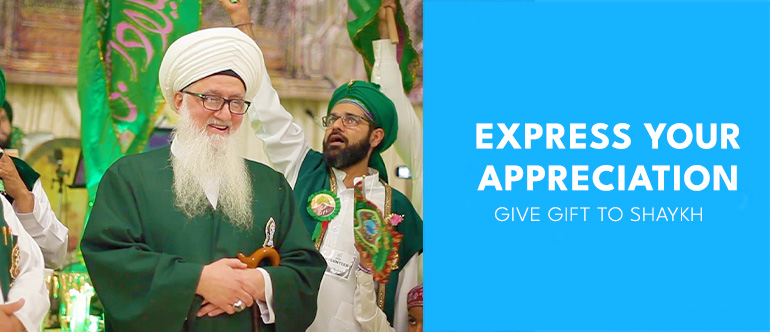

![[ID: xhlXm6DPlRE] Youtube Automatic](https://nurmuhammad.com/wp-content/uploads/id-xhlxm6dplre-youtube-automatic-236x133.jpg)
![[ID: 5AzKnEghDeU] Youtube Automatic](https://nurmuhammad.com/wp-content/uploads/id-5azkneghdeu-youtube-automatic-236x133.jpg)